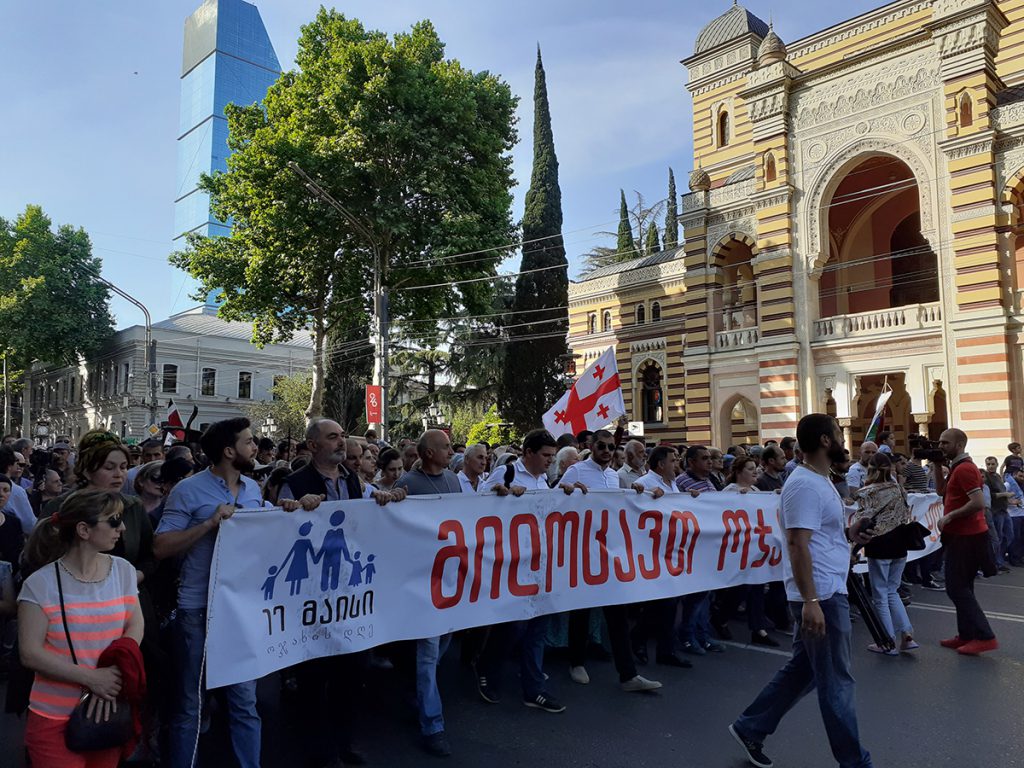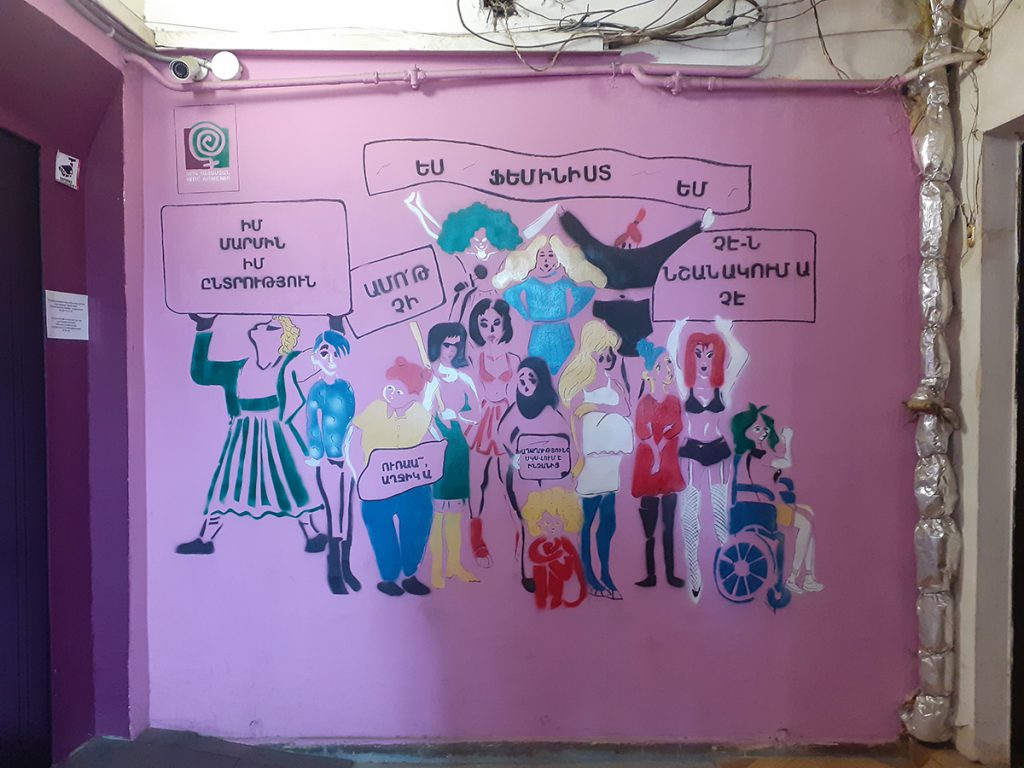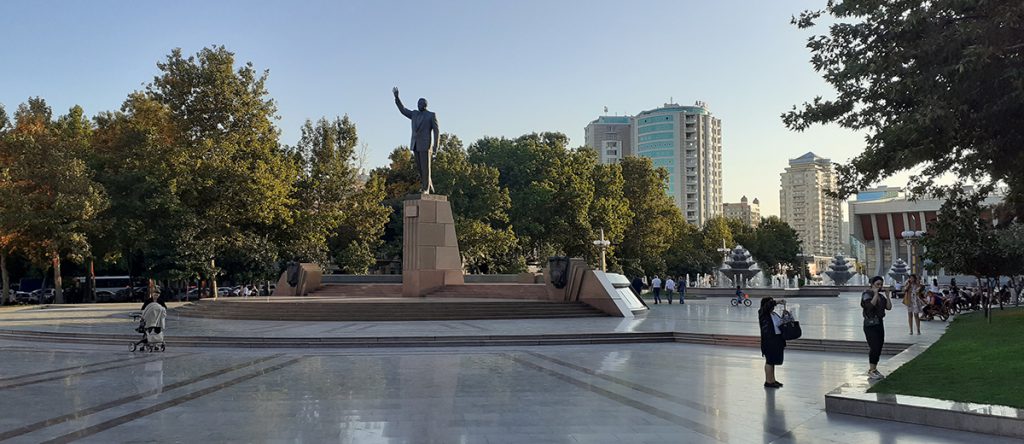As liberal norms promoted by the EU are fiercely contested, human rights groups in the South Caucasus face huge insecurity. Some propose alternatives to human rights promotion that challenge the EU’s development paradigms and competing authoritarian agendas. Laura Luciani argues that we should take them seriously
In a context of global democratic crisis and authoritarian realignment, the EU’s policies of human rights promotion are coming under fire. Across the Eastern neighbourhood, ultranationalist groups are manipulating women’s and LGBTQ rights as a Western ‘Trojan horse’ destroying local traditions. Hybrid and authoritarian regimes have successfully restricted the activities and transnational connections of civil society organisations (CSOs).
In the South Caucasus, these trends intertwine with EU-Russia competition and unresolved conflicts. Over the past few years, we have seen homophobic mobs in Georgia’s capital city; waves of anti-gender campaigns in Armenia; and the further marginalisation of progressive voices in post-war Azerbaijan.

At times of contestation, pundits call on the EU to be more coherent, consistent and effective in its norms promotion. The effects EU policies produce in the target countries – including the unintended and perverse ones – have received less attention. However, these policies have serious consequences for human rights groups in the region. Such groups are caught between EU-sponsored paradigms they feel obliged to promote, and mounting contestation from illiberal or nationalist factions.
Since 2011, the EU has reinstated civil society’s crucial role in development, democracy and human rights promotion. Alongside this, it has contributed to Western efforts to ‘build the capacities’ of CSOs in the post-Soviet South Caucasus.
Local human rights groups have benefited from funding and opportunities to participate in domestic policy developments. Yet despite the ‘local ownership’ rhetoric, governments in the South Caucasus have met EU efforts with suspicion. The historical disconnect between the general public and organised civil society has persisted, together with the latter’s dependency on donor funding.
EU human rights promotion in the post-Soviet South Caucasus overlooks the obstacles human rights groups and activists face on the ground
My doctoral dissertation examines EU human rights promotion in the South Caucasus from the often-neglected perspective of local civil societies. I found that EU policies overlook the realities and obstacles human rights NGOs and activists face on the ground. Amid a shifting geopolitical conjuncture, such interventions may even limit these groups’ room for manoeuvre in managing domestic resistance.
EU funding requirements push CSOs to professionalise and compete, reducing the time they can dedicate to grassroots mobilisation and depoliticising radical claims. For instance, such requirements might co-opt local feminist struggles to end violence against women as a means towards (neoliberal) economic development.
The EU assumes that social change will follow from partner countries’ ‘approximation’ to its own human rights standards. It measures these by passing laws or by institution-building. But this is hardly conducive to real change in societal attitudes. Such a legalistic, top-down approach may also unintentionally spur backlash against ‘foreign interventions’.

Furthermore, it portrays the EU’s own experience as universally applicable, as the conflation of human rights with ‘European values’ suggests. Activists may appropriate geopolitical framings of human rights to hold governments accountable, if these aspire to closer EU integration.
The EU assumes that social change will follow from partner countries’ ‘approximation’ to the EU's own human rights standards
At once, these shortcuts reproduce a hierarchy of more or less European (= civilised) countries and societies. Moreover, they obscure the fundamental limitations of Western human rights frameworks: notably, the neglect of the structural, material and gendered inequalities feeding societal insecurities and suspicion vis-à-vis Western ‘cultural imperialism’.
In 2020, the European Commission set out a 'geopolitical agenda' on human rights and democracy. Following Russia’s war against Ukraine, demands for a more security-conscious Union have gained further traction.
This geopolitical turn reinforces already problematic tendencies. First, there is the doubling-down on the EU’s mission civilisatrice in opposition to ‘bad others’: Russia, China, or the 'jungle' outside the European 'garden'. Second, there is an invocation of Realpolitik to endorse neoliberal and extractivist policies that disregard human rights.

For instance, the EU is willing to whitewash Azerbaijan’s authoritarian regime as a 'trustworthy' partner to guarantee Europe’s energy security. Yet this results in greater insecurity for the Armenian population of Nagorno-Karabakh – where Azerbaijan’s blockade is causing a humanitarian crisis – and a silencing of already-suppressed Azerbaijani anti-war voices.
I have spoken with activists operating at the margins of EU funding schemes. They offered me a glimpse into alternatives to human rights promotion as currently envisaged by Brussels.
These people suggest that civil society should refocus its efforts on activism at grassroots level. It should shift from project-based, measurable outputs towards radical, long-term transformation of societies. Of course, this would require different and more sustainable forms of socio-political organising, beyond the donor-driven grants economy and depoliticised civil society engagement.
Human rights remain the frame of reference for the EU and CSOs in the region. However, more radical claims for dignity and justice also deserve a hearing. We cannot tackle everyday oppression through individual-centred rights-based frameworks. Doing so would require a broader redistribution of resources.
The EU's development model in the South Caucasus is exacerbating poverty, economic injustice, and the devastating consequences of post-socialist capitalism in the region
Current human rights programming fails to account for poverty, economic injustices and the devastating consequences of (post-socialist) capitalism. Moreover, the EU’s development model in the region only serves to exacerbate these problems. An alternative politics of human rights promotion would re-centre this agenda away from EU-niversal models and geopolitical frames – and onto local needs.
Illiberal forces have been the most vocal in questioning the legitimacy of the EU’s norms promotion in the South Caucasus. However, they are not the only ones.
Faced with the EU’s inability to tackle insecurities – and its role in (re)producing them – left-wing, feminist and anti-war activists are now calling for inclusive coalitions of solidarity that strive for security and justice in physical, socio-economic, and environmental terms.
These alternatives to human rights promotion require a radical re-thinking of the EU’s engagement on the global stage. Admittedly, they do not conform to the EU’s benchmarks of ‘visibility’ and ‘success’ in bringing ‘positive change’, and may seem too utopian to practice in the current geopolitical environment.
Indeed, they constitute attempts to imagine different futures. These futures lie beyond the options currently offered by the EU’s neoliberal and geopolitical development logics; and beyond the nationalist, authoritarian and imperialist agendas in the South Caucasus which propose no true emancipation.